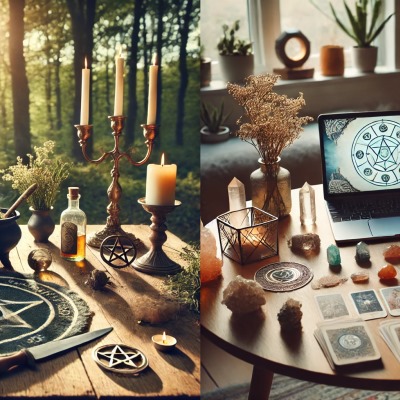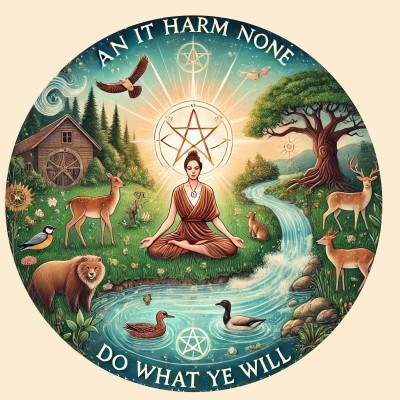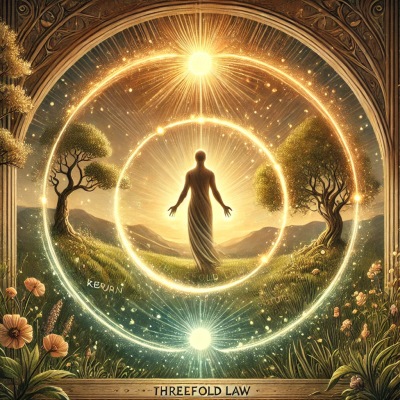Brief History and Origins of Wicca
Wicca is a modern Pagan religious movement that originated in the early 20th century, although it draws inspiration from ancient pre-Christian beliefs and practices in Europe. The term “Wicca” itself began to emerge in the mid-20th century, primarily through the work of Gerald Gardner, who is often considered the “Father of Modern Wicca.” Gardner, a British civil servant, introduced Wicca to the public in the 1950s through his writings and teachings, claiming to have been initiated into a surviving witchcraft tradition in England.

Gardner’s form of Wicca combined elements from folklore, ceremonial magic, and 19th-century occultism with his own interpretations and influences from other practitioners of the time, such as Aleister Crowley and Doreen Valiente. Gardner’s Wicca emphasized the worship of a dual deity structure—a Goddess and a God—and centered around nature, the changing seasons, and the cycle of life.
Since then, Wicca has evolved into multiple traditions, such as Gardnerian, Alexandrian (founded by Alex Sanders), and more eclectic branches. Wicca became particularly popular in the United States in the 1960s and 70s, coinciding with the broader countercultural movement and a resurgence of interest in alternative spirituality. Today, Wicca continues to be practiced worldwide in various forms, with a focus on nature worship, personal spirituality, and the ethical principle of “harm none.”
Explanation of modern Wicca vs. traditional practices
Modern Wicca and traditional practices differ primarily in their origins, structure, and approach to worship. Here’s an explanation of the two:
Traditional Practices
Traditional witchcraft, from which Wicca draws some inspiration, refers to the various folk magic and spiritual practices that predate Wicca and were often tied to local customs and regional beliefs. These practices existed in rural and indigenous communities across Europe and often involved herbalism, folk healing, divination, and rituals closely connected to the land and agricultural cycles. Traditional practices typically lacked a standardized structure or formalized teachings and were passed down through families or small communities.

In traditional witchcraft, there often wasn’t a specific religious framework; instead, it was a collection of magical practices, superstitions, and rituals rooted in the local culture. Worship or veneration wasn’t necessarily focused on a particular deity, but rather on spirits of the land, ancestors, and sometimes a folk god or goddess figure.
Modern Wicca
Modern Wicca, established in the mid-20th century by figures like Gerald Gardner, developed as a distinct religion rather than just a magical practice. Wicca introduced a formalized structure, specific rituals, and a clear theological framework, which emphasized the worship of a dual deity—the Goddess and the God—alongside nature and seasonal cycles. This dual deity concept was a new addition, influenced by contemporary interpretations of pre-Christian beliefs rather than being a direct continuation of any one folk tradition.
Modern Wicca is known for its Wheel of the Year, an eight-sabbat system celebrating solstices, equinoxes, and other seasonal festivals, which structure the practice of modern Wiccans. Rituals in modern Wicca, such as circle casting and the use of specific tools (e.g., athame, chalice), are generally standardized and accessible in books, making Wicca highly adaptable and eclectic.
While traditional witchcraft was often solitary and decentralized, modern Wicca may be practiced either individually or in covens, with some traditions (like Gardnerian and Alexandrian Wicca) maintaining initiation rites and lineages. However, modern Wicca is flexible, and many practitioners are eclectic, drawing from various sources to create a personal path.
Key Differences
- Spiritual Framework: Traditional practices focus on folk magic and local customs without a formalized deity structure, while modern Wicca emphasizes a dual deity and seasonal cycle.
- Structure: Wicca has a standardized ritual structure and tools; traditional practices are often informal and vary by region.
- Accessibility: Modern Wicca is widely available in books and online, whereas traditional practices were closely guarded and passed down through generations or communities.
- Approach: Traditional practices focus more on practical folk magic, while Wicca combines religious worship with ritual magic within a nature-centered framework.
Both traditional practices and modern Wicca share a reverence for nature and the cycles of life, but Wicca has created a cohesive, accessible, and adaptable system that appeals to contemporary spiritual seekers.
Core Beliefs and Principles
The Wiccan Rede: “An it harm none, do what ye will”
The Wiccan Rede is one of the most central ethical guidelines in Wicca. Often stated as “An it harm none, do what ye will,” the Rede emphasizes personal responsibility and respect for all life, guiding practitioners to make thoughtful choices that avoid causing harm to others and themselves. Unlike strict religious commandments, the Rede is more of a guiding principle that encourages Wiccans to think carefully about the impact of their actions.

Meaning of the Rede
The phrase “An it harm none” means “if it does not harm anyone.” This includes not just physical harm but also emotional, mental, and spiritual harm. The second part, “do what ye will,” suggests that Wiccans are free to follow their will, desires, and path, as long as they consider and respect the potential consequences. This openness reflects the Wiccan belief in individual freedom and personal responsibility.
Practical Application
The Wiccan Rede is not just a concept to be understood; it’s intended to be applied in all areas of life. This could mean choosing not to perform a spell or ritual that might interfere with someone’s free will, or making decisions that respect the environment and other beings. Wiccans often use the Rede to guide their ethical decisions, whether in spiritual practice, relationships, or everyday life.
For example:
- In Magic: The Rede advises against using spells for personal gain if it could hurt others or disrupt the natural order. Many Wiccans avoid spells that manipulate others’ thoughts or feelings, focusing instead on self-improvement or protective magic.
- In Relationships: Practicing the Rede means considering how words and actions might impact others emotionally and working to build positive connections that respect each person’s boundaries.
- In the Environment: Respect for nature is central to Wicca, and the Rede encourages Wiccans to act as stewards of the earth, making choices that minimize harm to plants, animals, and ecosystems.
The Rede and Personal Responsibility
The Wiccan Rede places a high value on personal responsibility, meaning Wiccans must think critically and carefully about their choices. It is up to each practitioner to determine what actions are “harmful” and how to act accordingly. There is no strict rulebook; instead, the Rede empowers Wiccans to evaluate situations, listen to their intuition, and act in alignment with their highest values.
Challenges of Following the Rede
Applying the Wiccan Rede can sometimes be challenging. Life often presents situations where “harm none” is complex or even impossible to fully achieve. In such cases, Wiccans are encouraged to seek balance, consider all perspectives, and choose the path that minimizes harm as much as possible. This might involve weighing different factors and accepting that sometimes, the best option may still involve some level of compromise or sacrifice.
Connection to the Threefold Law
Many Wiccans also believe in the Threefold Law, which states that any energy a person puts into the world, whether positive or negative, will return to them threefold. The Rede, combined with this belief, reinforces the idea that ethical actions are not just beneficial for others but will ultimately bring good back to the practitioner.
The Rede as a Spiritual Philosophy
For many Wiccans, the Rede serves as more than just an ethical guideline—it’s a philosophy that shapes their spiritual identity. By promoting harmony, respect, and personal freedom, the Rede empowers Wiccans to live with awareness, kindness, and integrity. It helps create a spiritual path that is compassionate, responsible, and aligned with the cycles of nature and the interconnectedness of all life.
Ultimately, the Wiccan Rede invites practitioners to approach life with empathy, mindfulness, and respect, embracing the freedom to follow their own path while honoring the well-being of others.
The Threefold Law and Karma
The Threefold Law and the concept of karma are both important principles within Wicca, encouraging practitioners to consider the effects of their actions on themselves and others. While these ideas share similarities, they have distinct meanings and origins.

The Threefold Law
The Threefold Law is a Wiccan belief that any energy or intent a person puts into the world will return to them three times over. This applies to both positive and negative actions, suggesting that kindness, generosity, and positive magic will bring beneficial returns, while harmful or malicious acts will bring hardship in triple measure.
How the Threefold Law Works
The Threefold Law is not literal; rather, it’s a spiritual principle that encourages mindfulness. It doesn’t mean that every action results in exactly three times the consequence, but instead emphasizes that our actions ripple outward and affect both others and ourselves. It’s a way to remind practitioners that whatever they put into the universe—whether it’s kindness, love, or negativity—will come back to them in some form, often magnified.
Application in Wiccan Practice
The Threefold Law guides Wiccans to act with integrity and compassion in both their spiritual and daily lives. For example:
- In Magic: A Wiccan might think carefully before casting a spell, ensuring it aligns with their values and does no harm. Protective spells, healing work, and blessings are examples of positive magic encouraged by the Threefold Law.
- In Relationships: The Law encourages Wiccans to treat others with respect and honesty, knowing that these actions foster goodwill that will be returned to them.
- In Environmental Stewardship: Many Wiccans interpret the Threefold Law as a call to care for the earth, understanding that caring for nature also nurtures themselves and future generations.
The Threefold Law ultimately reinforces the Wiccan Rede by reminding practitioners that their actions have consequences and that living in harmony benefits both the individual and the community.
Karma in Wicca
The concept of karma is originally from Eastern spiritual traditions, such as Hinduism and Buddhism, where it represents the universal law of cause and effect. In its original context, karma extends beyond a single lifetime, suggesting that actions in one life can influence future incarnations. In Wicca, karma has been adapted more loosely, often interpreted as the idea that good or bad actions result in similar outcomes over time.
Differences Between the Threefold Law and Karma
While both the Threefold Law and karma focus on the consequences of actions, they differ in several ways:
- Threefold Magnification: The Threefold Law emphasizes that actions return to the individual with amplified effects, while karma does not specify a multiple—it’s a more straightforward cause-and-effect relationship.
- Single Lifetime vs. Reincarnation: Wiccan interpretations of karma are often limited to the present lifetime, though some Wiccans do believe in reincarnation and the idea that actions can influence future lives.
- Intent and Accountability: The Threefold Law is more immediate, applying directly to Wiccan practice and magic, while karma is often viewed as a broader principle, sometimes operating on an unseen, cosmic level that may unfold over many lifetimes.
How Karma and the Threefold Law Shape Wiccan Practice
Together, these principles encourage Wiccans to practice ethical magic, treat others with respect, and approach the world with empathy. They remind practitioners that their thoughts, words, and actions shape both their lives and the lives of those around them. Here’s how they influence Wiccan practice:
- Self-Reflection: Wiccans regularly reflect on their actions, intentions, and energy to ensure they align with their values. They consider how their choices may affect others, knowing that harm or negativity may ultimately impact them as well.
- Accountability: The Threefold Law and karma encourage Wiccans to take responsibility for their actions. Rather than blaming external factors, Wiccans recognize that their own energy and intentions play a significant role in their life experiences.
- Personal Growth: Believing in these principles motivates many Wiccans to strive for self-improvement, as they see the benefit of cultivating positive qualities like kindness, patience, and generosity.
The Threefold Law, Karma, and Personal Freedom
Both the Threefold Law and karma empower Wiccans with the freedom to choose their actions, emphasizing that every choice shapes their path. Wiccans understand that they are co-creators of their reality, choosing how they wish to live and what energy they wish to put into the world.
These principles serve as reminders that actions and intentions have lasting impacts. By focusing on positivity, harmony, and respect for others, Wiccans believe they can create a fulfilling, spiritually aligned life.
Sign up today and unlock our exclusive 68-page “Beginner’s Guide to Wicca” in our resource library! Dive into everything you need to start your journey, from foundational beliefs and practices to rituals, tools, and more. As a VIP, you’ll gain access to this comprehensive guide and be the first to receive special insights, magical tips, and members-only offers! 🌿🔮
Begin your journey—sign up now and discover the path that awaits you!
